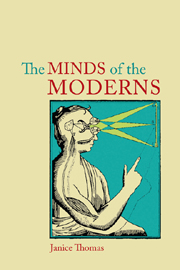Book contents
- Frontmatter
- Contents
- Acknowledgements
- Abbreviations
- Introduction
- I Descartes
- II Spinoza
- III Leibniz
- 11 Is the mind a substance for Leibniz?
- 12 Self-knowledge and the monads
- 13 Leibniz on consciousness and unconscious perceptions
- 14 Leibniz and the problem of mental causation
- 15 Leibniz and representation
- IV Locke
- V Berkeley
- VI Hume
- Conclusion
- Bibliography
- Index
12 - Self-knowledge and the monads
from III - Leibniz
- Frontmatter
- Contents
- Acknowledgements
- Abbreviations
- Introduction
- I Descartes
- II Spinoza
- III Leibniz
- 11 Is the mind a substance for Leibniz?
- 12 Self-knowledge and the monads
- 13 Leibniz on consciousness and unconscious perceptions
- 14 Leibniz and the problem of mental causation
- 15 Leibniz and representation
- IV Locke
- V Berkeley
- VI Hume
- Conclusion
- Bibliography
- Index
Summary
As we have seen, for Leibniz, the only substances are the simple monads, which are the basis of all reality. Wholly independent of all external influences, each monad is imbued with its own internal active principle or force, which means that all its actions spring from its own depths (LA 170; G 136). And all substances of every grade have perceptions. Bare monads have nothing but unconscious perceptions (without memory) but non-human animals and human beings are said to have sensation as well as perception. Or rather, more precisely, Leibniz says that, because they possess sense organs that focus and concentrate their perceptions, many animals' perceptions are heightened and thus become distinct enough to be sensations. That is to say, many of the perceptions belonging to higher animal and human souls are available to what Leibniz calls “apperception” or “reflection” and are thus in some way conscious.
At the top of his hierarchy (at least among earthly beings), Leibniz's human minds differ from the dominant monads or souls of other animals and thus also from the dominant monads of plants and the bare monads constituting mere material objects. For in addition to bare perceptions and even apperceived heightened ones, human minds have mental states that are not just conscious but self-conscious.
To find what sorts of self-knowledge Leibniz thinks possible for human minds we need to try to discover what he means by “apperception” and “reflection” and how, if at all, he thinks apperception differs from perception, consciousness and memory.
- Type
- Chapter
- Information
- The Minds of the ModernsRationalism, Empiricism and Philosophy of Mind, pp. 110 - 119Publisher: Acumen PublishingPrint publication year: 2009

